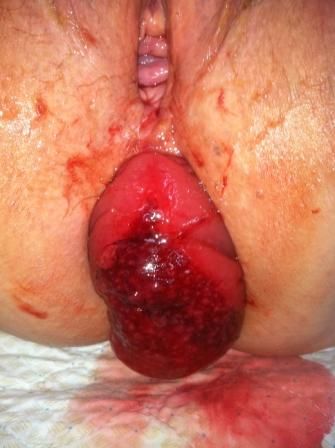- Clinical Technology
- Adult Immunization
- Hepatology
- Pediatric Immunization
- Screening
- Psychiatry
- Allergy
- Women's Health
- Cardiology
- Pediatrics
- Dermatology
- Endocrinology
- Pain Management
- Gastroenterology
- Infectious Disease
- Obesity Medicine
- Rheumatology
- Nephrology
- Neurology
- Pulmonology
Strangulated Rectal Prolapse
Incarcerated rectal prolapse is uncommon and seen mainly in elderly female patients. If ischemia is present, perineal proctosigmoidectomy is the only remaining treatment option.

An 80-year-old woman presented to the emergency department complaining of rectal pain, bleeding, and protrusion of 36 hours’ duration. She said the protrusion had occurred acutely following a period of straining to have a bowel movement; the pain, swelling, and bleeding increased over the next several hours.
Her vital signs were stable and medical history was significant for persistent constipation. She had for several years been taking a calcium channel blocker for hypertension. A colonoscopy performed 2 years earlier found sigmoid diverticulosis but was otherwise negative.
Examination found an irreducible, ischemic, full-thickness rectal prolapse (Figure). The distal portion of the prolapsed rectum was already ischemic.
Complete blood cell count found a white blood cell count of 14,000/µL. Treatment with intravenous antibiotics was initiated, and the patient was prepared for surgery. Perineal proctectomy was performed and intestinal continuity was restored by an anastomosis. She recovered well after the surgery.
Discussion
Incarcerated rectal prolapse is an uncommon condition and mainly is observed in elderly female patients. It can generally be reduced manually by gentle pressure either under mild sedation or with general anaesthesia, after failed initial conservative treatment. If ischemia is present, as in this case, a perineal proctosigmoidectomy procedure is the only remaining treatment option. This can be achieved with low recurrence and mortality rates in elderly high-risk patients.1 Reference
1. Ramanujam PS, Venkatesh KS, Fietz MJ. Perineal excision of rectal procidentia in elderly high-risk patients. A ten-year experience. Dis Colon Rectum. 1994;37:1027-1030.
AI-Powered Diabetes Prevention Program Intervention Matches Human Coaching in Landmark Trial
October 27th 2025After 1 year of coaching by the AI app or a DPP-associated coach, reductions in weight and HbA1c and increases in physical activity were equal, an outcome with great promise for scalability.
